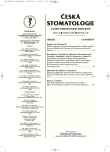Biophysical Mechanism Determining Dental Implants Biocompatibility and Conditioning their Osseointegration
Authors:
S. Bartáková 1; P. Prachár 1; S. Hasoň 1,2; R. Silvennoinen 3; L. Cvrček 4; L. Strašák 1,2; L. Fojt 1,2; A. Avranas 5; V. Vetterl 1,2
Authors‘ workplace:
Stomatologické výzkumné centrum LF MU, Brno
1; Biofyzikální ústav AV ČR, v. v. i., Brno
2; University of Joensuu, Department of Physics and Mathematics, Joensuu, Finsko
3; HVM Plasma, spol. s r. o., Praha
4; Laboratory of Physical Chemistry, Department of Chemistry, Aristotle University of Thessaloniki, Thessaloniki, Řecko
5
Published in:
Česká stomatologie / Praktické zubní lékařství, ročník 109, 2009, 3, s. 48-53
Overview
Adsorption of biopolymers at the titanium and titanium carbide surface increases the optical roughness as well as the thickness and refractive index of the surface layer. Fibrinogen is better adsorbed at the titanium surface which is treated by polishing and etching than at the surface treated only by polishing. The best adsorption of fibrinogen was observed at the titanium carbide surface prepared by plasma-enhanced chemical vapour deposition, the optimal ratio was Ti0,38 - C0,62 a Ti0,09 - C0,91. The surface of dental implants treated by this way should speed up their osseointegration and healing. The single stranded pyrimidine oligodeoxynucleotides (TTC)12 are better adsorbed at the titanium surface than the purine oligodeoxynucleotides (AAG)12. The double-helical duplex (TTC)12. (AAG)12 has no effect on the optical properties of the titanium surface and probably is not adsorbed there.
Key words:
titanium implants - fibrinogen adsorption - oligodeoxynucleotide adsorption - diffractive optical element - ellipsometry
Sources
1. Brett, P. M., Harle, J., Salih, V., Mihoc, R., Olsen, I., Jones, F. H., Tonetti, M.: Roughness response genes in osteoblasts, Bone, 35, 2004, s. 124-133.
2. Cacciafesta, P., Hallam, K. R., Watkinson, A. C., Allen, G. C., Miles, M. J., Jandt, K. D.: Visualisation of human plasma fibrinogen adsorbed on titanium implant surfaces with different roughness. Surf. Sci., 491, 2001, s. 405-420.
3. Cacciafesta, P., Humphris, A. D. L., Jandt, K. D., Miles, M. J.: Human plasma fibrinogen adsorption on ultraflat titanium oxide surfaces studied with atomic force microscopy. Langmuir, 16, 2000, s. 8167-8175.
4. Cochran, D. L.: A comparison of endosseous dental implant surfaces. J. Periodontol., 70, 2000, s. 1523-1539.
5. Hasoň, S., Simonaho, S. P. Silvennoinen, R.,Vetterl, V.: On the adsorption and kinetics of phase transients of adenosine at the different carbon electrodes modified with a mercury layer. Electrochimica Acta, 48, 2003, s. 651-668.
6. Hasoň, S., Simonaho, S. P., Silvennoinen, R., Vetterl, V.: Detection of phase transients in two-dimensional adlayers of adenosine at the solid amalgam electrode surfaces. J. Electroanal. Chem., 568, 2004, s. 65-77.
7. Hasoň, S., Vetterl, V., Fojta, M.: Two-dimensional condensation of pyrimidine oligonucleotides during their self-assemblies at mercury based surfaces. Electrochimica Acta, 53, 2008, s. 2818-2824.
8. Hemmersam, A. G., Foss, M., Chevallier, J., Besenbacher, F.: Adsorption of fibrinogen on tantalum oxide, titanium oxide and gold studied by the QCM-D technique. Colloid Surf. B, 43, 2005, s. 208-215.
9. Humlíček, J. C. Bernard, C.: Diffraction effects in infrared ellipsometry of conducting samples. Thin Solid Films, 455-456, 2004, s. 177-182.
10. Humphreys, M. W., Parsons, R.: Ellipsometry of DNA adsorbed at mercury electrodes: A preliminary study. J. Electroanal. Chem., 75, 1977, s. 427-436.
11. Jansoon, E., Tengvall, P.: Adsorption of albumin and IgG to porous and smooth titanium. Colloid Surf. B, 35, 2004, s. 45-51.
12. Jones, M. I., McColl, I. R., Grant, D. M., Parker, K. G., Parker, T. L.: Protein adsorption and platelet attachment and activation on TiN, TiC, and DLC coatings on titanium for cardiovascular applications. J. Biomed. Mater.Res., 52, 2000, s. 413-421.
13. Juany, N., Yang, P., Leng, Y. X., Chen, J. Y., Sun, H., Wang, G. J., Ding, P. D., Xi, T. F., Leng, Y.: Hemocompatibility of titanium oxide films. Biomaterials, 24, 2003, s. 2177-2187.
14. Karagkiozaki, V., Logothetidis, S., Kalfagiannis, N., Lousinian, S., Giannoglou, G.: Atomic force microscopy probing platelet activation behavior on titanium nitride nanocoatings for biomedical applications. Nanomedicine: Nanotechnology, Biology and Medicíně, 5, 2009, s. 64-72.
15. Kulikovsky, V., Kuzmichev, A., Bohaca, P., Hubicka, Z., Jurek, K., Jastrabik, L.: Composition of Ti-C:H films obtained by pulsed and continuous magnetron sputtering. Surf. Coat. Technol., 200, 2005, s. 620-624.
16. Nygren, H., Tengvall, H. P., Lundstrom, I.: The initial reactions of TiO2 with blood. J. Biomater. Res., 34, 1997, s. 487-492.
17. Rouahi, M., Champion, E., Gallet, O., Jada, A., Anselme, K.: Physico-chemical characteristics and protein adsorption potential of hydroxyapatite particles: Influence on in vitro biocompatibility of ceramics after sintering. Colloid Surf. B, 47, 2006, s. 10-19.
18. Silvennoinen, R., Hasoň, S., Vetterl, V.: Organization of nano-scale synthetic oligonucleotides on immersed electrode surface: an optical study. In Peiponen, K.-E., Hernberg, R., Yatagai, T.(editors): Technical digest of the Seventh Finnish-Japanese joint symposium on optics in engineering, (8-10 August, Tampere, Finland, 2007), s. 101-102.
19. Silvennoinen, R., Peiponen, K. E., Myller, K.: Specular gloss . Amsterdam, Elsevier, Amsterdam, 2007.
20. Silvennoinen, R.,Vetterl, V., Hasoň, S., Tuononen, H., Silvennoinen, M., Myller, K., Cvrček, L., Vaněk, J., Prachár, P.: Sensing of human plasma fibrinogen on polished, chemically etched and carbon treated titanium surfaces by diffractive optical element based sensor. Optics Express, 16, 2008, č. 14/10130.
21. Vetterl, V., Hasoň, S., Tuononen, H., Silvennoinen, M., Myller, K.,Vaněk, J., Silvennoinen, R.: Diffractive optical element spectroscopy of biomaterial surface. Proc. of SPIE, 7022, 2008, 702203. (Advanced Laser Technologies 2007, edited by Ivan A. Shcherbakov.)
22. Vitu, T., Polcar, T., Cvrček, L., Novák, R., Macák, J., Vyskočil, J., Cavaleiro, A.: Structure and tribology of biocompatible Ti-C:H Coatings. Surf. Coat. Technol., 202, 2008, s. 5790-5793. (Sixth Asian-European International Conference on Plasma Surface Engineering.)
23. http://www.haemtech.com/Platelet_Proteins/Fibrinogen. htm.
Labels
Maxillofacial surgery Orthodontics Dental medicineArticle was published in
Czech Dental Journal

2009 Issue 3
Most read in this issue
- Healing of Pathologic Bone Cavities of Jaws after Augmentation
- Papillon-Lefevre Syndrome
- Tooth Autotransplantation. A Review
- Salivary Markers for Diseases of Periodontium and other Organs
